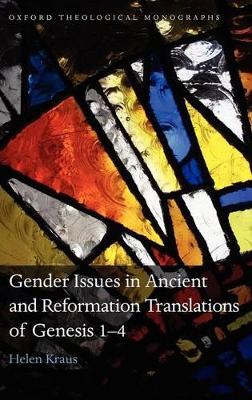Oxford Theological Monographs
1 total work
Gender Issues in Ancient and Reformation Translations of Genesis 1-4
by Helen Kraus
Published 20 October 2011
This book deals with Bible translation and its development from Antiquity to the Reformation. Helen Kraus compares and analyses those translated passages in Genesis 1-4 that deal with the male-female dynamic, tracing linguistic and ideological processes and seeking to determine the extent of interaction between contemporary culture and translation. In response to the challenge of late 20th-century 'second wave' feminist scholarship, Kraus considers the degree and
development of androcentricity in these passages in both Hebrew and translated texts. The study is therefore something of a hybrid, comprising exegesis, literary criticism and reception history, and draws together a number of hitherto discrete approaches.
After an introduction to the problems of translation, and exegesis of the Hebrew text, five translations are examined: The Septuagint (the first Greek translation, thought to date from the 3rd century BCE), Jerome's 4th-century CE Latin Vulgate version, Luther's pioneering German vernacular Bible of 1523, the English Authorized Version (1611), and the Dutch State Bible (1637). A brief study of contemporary culture precedes each exegetical section that compares translation with the Hebrew
text. Results of the investigation point to the Hebrew text showing significant androcentricity, with the Septuagint, possibly influenced by Greek philosophy, emphasizing the patriarchal elements. This trend persists through the Vulgate and even Luther's Bible - though less so in the English and Dutch
versions - and suggests that the translators are at least partly responsible for an androcentric text becoming the justification for the oppression of women.
development of androcentricity in these passages in both Hebrew and translated texts. The study is therefore something of a hybrid, comprising exegesis, literary criticism and reception history, and draws together a number of hitherto discrete approaches.
After an introduction to the problems of translation, and exegesis of the Hebrew text, five translations are examined: The Septuagint (the first Greek translation, thought to date from the 3rd century BCE), Jerome's 4th-century CE Latin Vulgate version, Luther's pioneering German vernacular Bible of 1523, the English Authorized Version (1611), and the Dutch State Bible (1637). A brief study of contemporary culture precedes each exegetical section that compares translation with the Hebrew
text. Results of the investigation point to the Hebrew text showing significant androcentricity, with the Septuagint, possibly influenced by Greek philosophy, emphasizing the patriarchal elements. This trend persists through the Vulgate and even Luther's Bible - though less so in the English and Dutch
versions - and suggests that the translators are at least partly responsible for an androcentric text becoming the justification for the oppression of women.
